Michigan State senior Matt Costello captains Sports Illustrated's 17th annual All-Glue Team
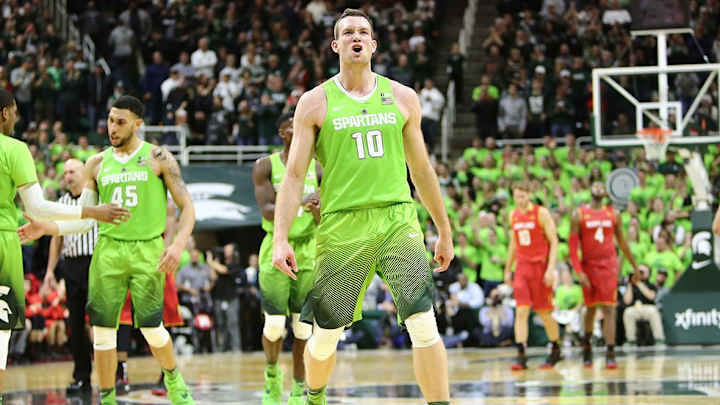
It was one of the season's most uplifting moments.
On Jan. 23, Michigan State coach Tom Izzo subbed out 6'9" senior forward Matt Costello with four seconds remaining in a win over Maryland. Three days before, Costello had suffered a badly sprained ankle toward the end of a home loss to Nebraska. He had not practiced and did not expect to play. Yet play he did, with enormous energy and devastating effectiveness, contributing 15 points, 12 rebounds, three blocks, two assists and two steals in a season-turning win. As the sellout crowd at the Breslin Center rose to its feet, Costello sprinted to the sidelines, wrapped his arms around Izzo's waist, lifted his coach off his feet, and twirled him around. When he placed Izzo back on the floor, he slapped his coach's back, tousled his hair and let out a guttural scream.
The video was replayed, shared, posted and Vined countless times in the following days, but the pictures alone did not explain all of the history that created that moment—not all of it pleasant. "There was so much emotion in that hug," Costello says. "It was a big game, a big moment, but I also think it was three-and-a-half years of struggling, trying to get that breakthrough, paying my dues, trying to become a top player on the team. It's amazing how it all worked out."
Like most players who come to a program of Michigan State's caliber, Costello envisioned himself eventually becoming a featured performer. Accepting that he was a supporting role player—a vital role, to be sure, but a role nonetheless—took some time. Now, however, Costello has done more than just accepted his responsibilities. He has embraced them, lifted them up, twirled them around. In doing so, he has evolved into a major reason why Michigan State is poised for a run at an NCAA championship.
Players like Costello do not typically get standing ovations. Their impact is not reflected in box scores or headlines. But there is one way in which Costello's fortifying contributions can be properly honored: He has been named the captain of the 17th annual SI.com All-Glue Team.
It took a while for Costello to buy into his sticky situation. As a senior at Bay City Western High School in Linwood, Mich., he averaged 25.1 points and 19.1 rebounds per game and was named the state's Mr. Basketball. While he was in high school, Costello befriended another player from the area, Draymond Green. Costello knew he wasn't the one-and-done type, but he figured his career at Michigan State would follow Green's path: Sit on the bench for a year or two, pay some dues, work hard, improve, and eventually the team would be his.
It didn't work out that way. As a freshman, Costello averaged 6.1 minutes per game and was regularly dominated in practice by the incumbent power forward, Derrick Nix. As a sophomore, he averaged just under 15 minutes, partly because he battled mononucleosis, but mostly because he was stuck behind another great player, Adreian Payne, who could not only score around the basket but also from behind the three-point line. Costello figured he needed to improve his outside shooting, so he spent most of the following summer developing that skill. It took some time, and more than a few blunt conversations, for Izzo to convince Costello that he was doing himself a disservice. "All he did that summer was shoot threes. I told him, 'That's fine, but you forgot how to make a post move,'" Izzo says. "He went through a tough time with that."
Izzo pushed Costello hard—not just to change his game, but also his mentality. Too often, Costello would coast and not use his physical talents. Izzo wanted him to play with more passion. Costello was used to being pushed hard by his father, Mike, a former walk-on at Division II's Ferris State, so he was prepared to handle Izzo's prodding, but the back-and-forth between them could appear jarring. "People think he argues with me, but I tell them, he's not arguing. He's just funky that way," Izzo says. "I usually like to push the guys I know can be something. Sometimes I don't think he believes in himself."
Even before his senior year began, Costello faced yet another threat, this time from Deyonta Davis, a 6'10" McDonald's All-American from Muskegon, Mich. Instead of bridling at the challenge, Costello attacked it head-on, and he has coexisted so well with Davis that Izzo often plays both at the same time. After grinding through the first six weeks of his senior season, Costello got his break in December, when the team's leading scorer Denzel Valentine missed four games with a knee injury. Valentine was Costello's roommate their first two seasons, and Valentine gave his pal a badly needed pep talk. "He told me, 'When I'm gone, that's 20 points off the board. You have to help us find that in other places,'" Costello says. "That gave me the opportunity to be more aggressive on the offensive end."
After failing to reach double-digit scoring in the previous nine games, Costello scored in double figures in three of the four games Valentine missed, including an inspired 17-point, seven-rebound effort in a loss at Iowa. Even after Valentine returned, Costello maintained his confidence, scoring 18 points (to go along with 13 rebounds) in a loss at Wisconsin. In Big Ten games this season, Costello averaged 12.5 points and 10.1 rebounds.
Costello knows he will never get the recognition that Valentine or other top scorers receive, but in many ways, that only enhances his gratification. His attitude and still-evolving ability bodes well for the Spartans as they face the challenges ahead. "To me, being a Glue Guy means doing all the little dirty stuff that nobody else will do, and knowing that you will get zero accolades for it," Costello says. "But you know it has to get done to win. The best way for me to put my stamp on Michigan State is to hang another banner."
Here are the other players named to the 2016 SI.com All-Glue team, followed by a list of the 16 previous teams and their captains.
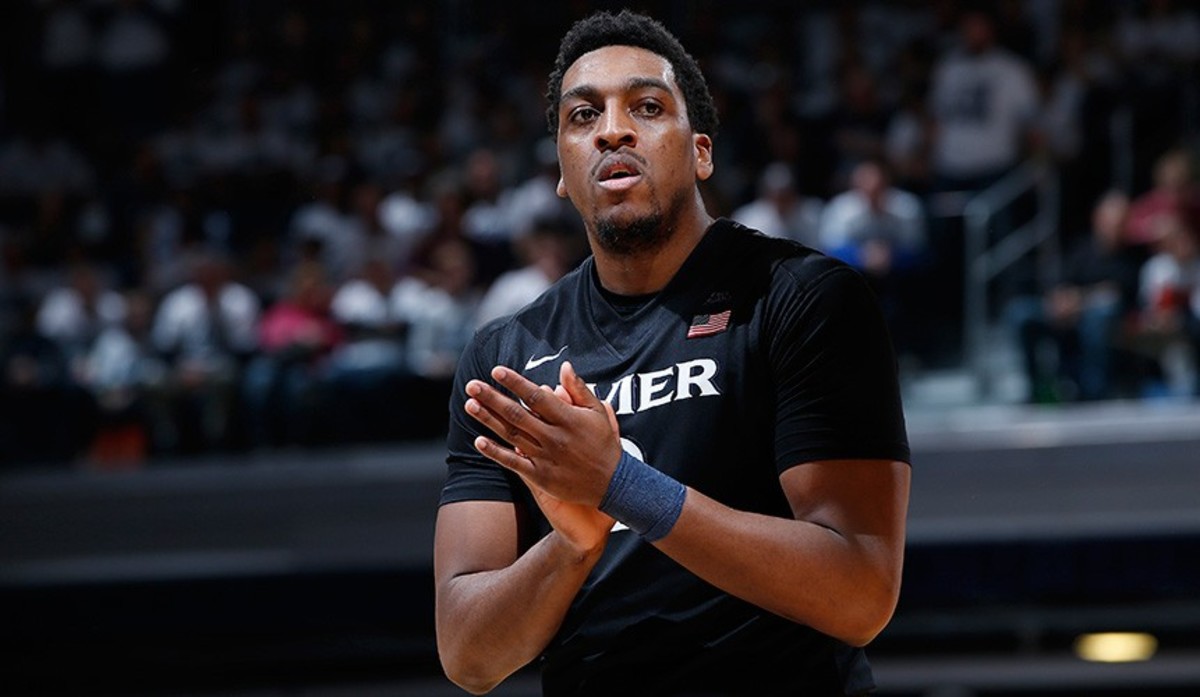
Getty Images
James Farr, 6'10" senior forward, Xavier
It is one thing for a Glue Guy to sacrifice the opportunity to score. Farr has also willingly sacrificed the opportunity to start, coming off the bench in all but four of the Musketeers' games this season. Yet, he is playing more minutes (20.7) than the team's starting center, Jalen Reynolds, and despite the limited playing time he is ranked fourth in the Big East in rebounds at 7.9 per game. He also ranks 17th nationally in offensive rebound percentage (15.2).
What's more, Farr is a gifted passer who has drastically improved his shooting percentages from the field (55.1%, up from 42.7% as a junior) and the foul line (76.5%, up from 46.9%). It is rare to see a college player make such a dramatic improvement between his third and fourth seasons. Rarer still is the player who sticks it out at one school despite minimal playing time his first two years. "When you see hundreds of guys transferring every year, you have to wonder, but we never got any rumblings that he was thinking about it," Xavier coach Chris Mack says. "That's called maturity."
Still, it wasn't until Farr decided to play to his strengths—namely, his size—that he became an effective player. Prior to this season, he fancied himself a face-up jump shooter. Farr attempted 95 three-point shots combined in his sophomore and junior seasons, even though he only made 32 of them. "He could always rebound, but it wasn't something that fueled his passion," Mack says. "That was true even at practice. I wouldn't say he had a bad attitude, but he'd be a Debbie Downer if he missed a couple of shots."
Last season, Farr started 26 games alongside 6'10" senior center Matt Stainbrook, but if he missed a couple of jump shots, Mack would feel compelled to sit him down. Farr's importance diminished as the season wore on, bottoming out when he had two points and one rebound in just 16 minutes during a Sweet 16 loss to Arizona. After Stainbrook graduated, Mack met with Farr several times during the off-season and hammered home an important message: If he wanted extended minutes as a senior, then Farr would have to change the way he played. "I told him, 'You have to not worry about how many points you score. I don't want you shooting threes. You need to be the best rebounder you can,'" Mack says. "His reponse was, 'Coach, I want to do whatever it takes to win.'"
The first encouraging sign came in a closed preseason scrimmage against Illinois, when Farr scored in the paint almost at will. "From that point he was like, 'Wow, I really can score down here.' And he never relented on the glass," Mack says. That paid off right away as Farr grabbed 14 rebounds in the team's second game, a Nov. 17 win over Missouri, and snared 13 boards three days later at Michigan. He maintained that level for most of the season, including a win at Marquette on Jan. 16 when Farr had 19 rebounds to go along with 16 points. And he has done all of that while attempting just seven three-pointers all season.
Most impressive of all is the way that Farr has readily accepted his role as sixth man, which Mack concedes would have been more difficult for Reynolds. That shows not just uncommon maturity but trust also trust in his coach. Farr's name may not be called in pregame warm-ups, but he knows that Mack will insert him into the game after the first few minutes, and if he takes smart shots and provides the Musketeers a presence on the glass, then Farr will keep right on playing.
Farr is a huge reason why Xavier has been ranked in the top 10 for most of the season and is on a short list of favorites to reach the Final Four. As the Musketeers' designated Glue Guy, Sixth Man and Glass Eater, Farr embodies the culture of toughness and sacrifice that makes this team a winner. "To see him come full circle from a guy who was being mentored by others to someone who is telling the younger guys how to do things, that has been really cool," Mack says. "He trusted the staff, and now he's seeing the results. Whatever we ask him to do, we know he's going to do it well."
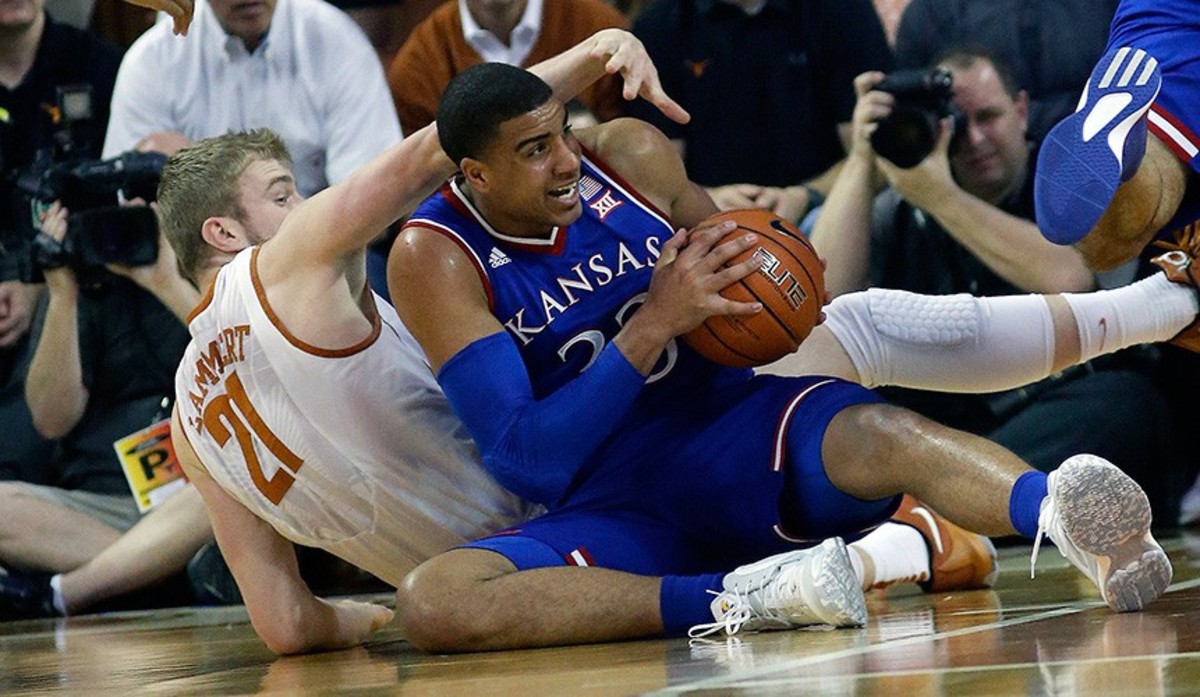
Getty Images
Landen Lucas, 6'10" junior forward, Kansas
For the first two months of the season, four of Kansas's five starting positions were solidified. Coach Bill Self, however, had a hard time deciding who the fifth should be. He rotated four different players through the position, and he even inserted little-used 6'9" freshman Cheick Diallo into the lineup for a game at Oklahoma State on Jan. 19. The result was a disastrous 86–67 loss.
After returning to Lawrence, an exasperated Self met with the four other starters and asked who they should join them. Their answer was unanimous: They wanted Lucas. "They all felt that Landen understood everything we were trying to do," Self says. "So that's when I decided to start him."
It's also when Kansas started winning again. The Jayhawks have lost just once with Lucas in the starting lineup. His size and rebounding ability have been a major boon, but mostly it's the way he thinks about the game that has made a difference. "We're a much smarter team when he's in there because he's as bright a player as we have," Self says. "He's not a naturally gifted scorer, but he understands how to use angles, how to set a fade screen late in the clock to get a guy a shot. He just knows how to play."
Lucas has needed to rely heavily on his beautiful mind to overcome some of his physical limitations. The native of Portland, Ore., spent his senior season of high school playing for Findlay Prep, the renowned basketball factory in Las Vegas. Yet, Lucas did not make any recruiting service's top-100 lists in his class. The only reason Kansas recruited him is because its top big man target, Kaleb Tarczewski, opted for Arizona. Lucas was so raw as a freshman that Self convinced him to redshirt so he could develop his strength.
Lucas averaged just 4.9 minutes per game as a redshirt freshman, but he became an increasingly effective player last season. He was promoted to starter late in the regular season when the team's center, Cliff Alexander, was declared ineligible and Lucas played well down the stretch. Lucas grabbed a total of 19 rebounds in Kansas's two NCAA tournament games.
Because of his offensive limitations, Self was reluctant to make Lucas a starter from Day 1 this season, but that changed after his meeting with the players following the pratfall at Oklahoma State. Lucas's coming out party occurred on Feb. 9, when he had 16 rebounds, nine points and four blocks in a pivotal 75–65 win over West Virginia. Afterwards, Self called him the best player in the game. Lucas is averaging a team-best 7.2 rebounds per game conference play, and it is fitting that this once-unheralded recruit is now playing ahead of the team's two ballyhooed freshmen forwards, Diallo and Carlton Bragg.
"Even though he wasn't as highly recruited as some other guys, I think Landen always had high expectations for himself," Self says. "He knows his role. He needs to be our best post defender so we don't have to trap. He has to be our best rebounder at both ends. He has to do the dirty work so [senior forward] Perry [Ellis] doesn't have to, because that's not naturally Perry's personality. And he has to give us an element of toughness."
In other words, he has to hold everything together. The public and the media may not always understand the value Lucas brings, but his teammates sure do. That is the Glue Guy's ultimate reward.
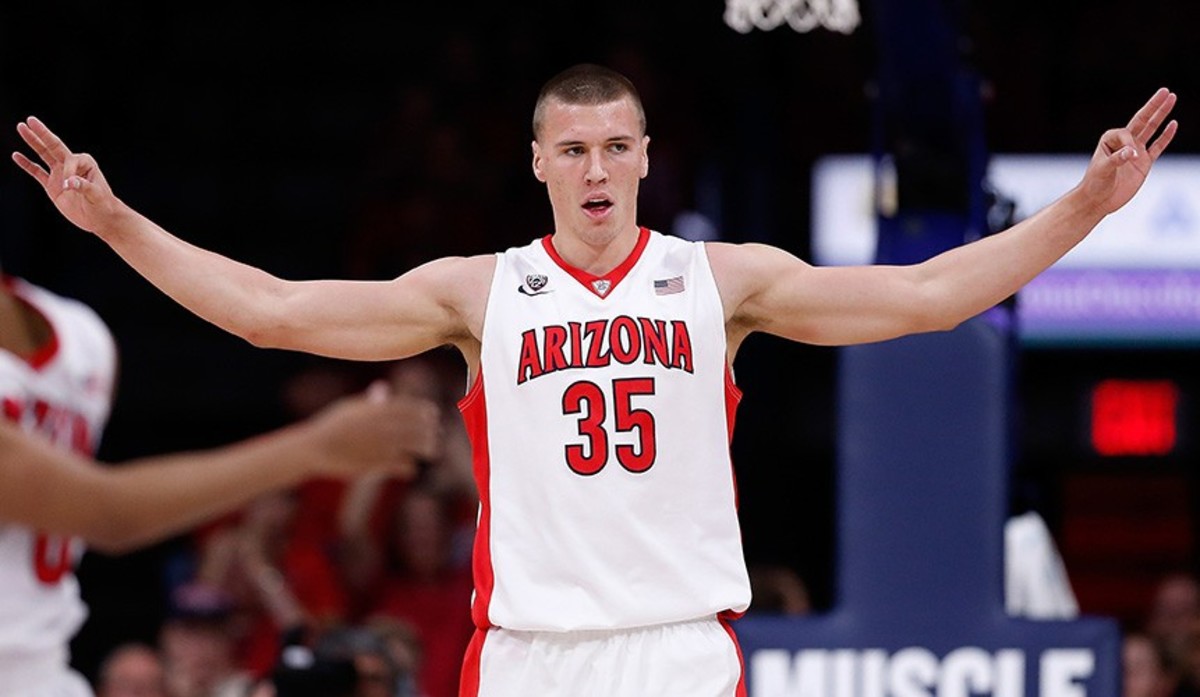
Getty Images
Kaleb Tarczewski, 7-foot senior center, Arizona
If Costello's embrace of Izzo was one of the season's most uplifting moments, then Tarczewski's confrontation with Arizona coach Sean Miller during a loss to Oregon on Jan. 28 in Tucson was its most primal. As Miller was tearing into his team's poor defense during a huddle, his senior center and captain shouted at him, "Relax!" Miller tried to ignore it, but when Tarczewski continued to bark back at his coach after play resumed, Miller yanked Tarczewski from the game, cursed at him and literally went nose-to-nose with him on the bench.
Miller got some heat in the days that followed for losing his cool, but for him, it was just another day in the life of coaching the man they call Big Zeus. "That wasn't the first blowup we've had. He shrugged it off in about an hour or two," Miller says. "Believe it or not, we have a very good relationship." Indeed, Miller fully recognizes that Tarczewski's nasty streak is a big reason why he is successful. It is part of what makes him such a valuable Glue Guy.
"Kaleb is no choir boy. Part of what fuels him is he's mean," Miller says. "Sometimes, if things don't go his way, he'll lash out at a teammate or a referee. We've worked hard with him on keeping that in check, and he has gotten better. He understands now that he's one of the leaders of this team."
Part of that is fulfilling his potential as an elite rebounder. This season, Tarczewski has nearly doubled his average from 5.2 boards per game as a junior to 9.1. In Pac-12 games alone, Tarczewski has grabbed 9.6 boards per game, which ranks third in the league. That has also helped Tarczewski become a big-time winner as well. When Arizona defeated Stanford, 94–62, on Saturday, he moved into a tie for first place on the school's alltime wins list with 109. He has been a huge part of that success, having started 128 out of 132 games in his career.
It's not surprising that Tarczewski has won a lot of games. What is surprising is the way he has done it. Coming out of St. Mark's School in Claremont, N.H., Tarczewski was rated in the top 10 of his class by ever major scouting service. That is usually a ticket for stardom, yet Tarczewski has never averaged more than 10 points per game in a given season. "I don't know if I envisioned him being a Glue Guy, but I knew he was a great competitor," Miller says. "He just made his mind up that he's going to defend and rebound his butt off, and if he scores, he scores."
Tarczewski got a better appreciation of that last summer, when he competed for Team USA at the Pan American Games in Toronto. He started all five games and was the team's seventh-leading scorer, but his 6.0 rebound average topped the squad even though he only played about 20 minutes per game. "That validated him," Miller says. "He really came to understand that he doesn't have to be this great scoring making jump hooks to be in the NBA. There is tremendous value in being smart and physical."
Tarczewski is a stunning physical specimen—"How many people in the world are seven feet tall with five percent body fat?" Miller says—but his greatest strength lies between his ears. He is on track to get a degree in Arizona's prestigious Eller College of Management, and he uses those smarts on defense. Throw in the nasty streak, and you have the makings of a program-defining Glue Guy. "It will be tough to say goodbye to Kaleb," Miller says. "He embodies all the qualities you want to see in a player."
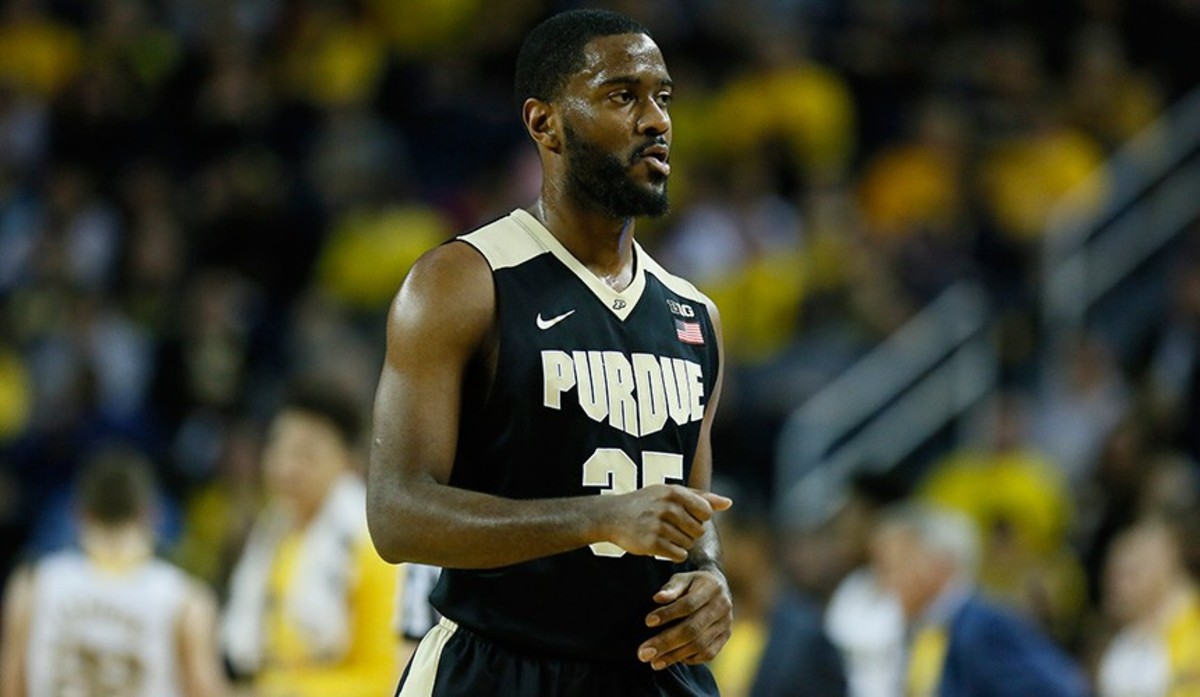
Getty Images
Rapheal Davis, 6'5" senior guard, Purdue
Davis scored more than 2,000 points at La Lumiere High School in Fort Wayne, Ind., but when he got to Purdue, he realized the team had plenty of scorers. The only way Davis was going to get extended minutes was by playing great defense. This was a major problem. "All the coaches said I was the worst defender they've ever seen," Davis recalls with a laugh. "That stung a little bit."
Rather than get discouraged, Davis dug in, studied video, and willed himself into becoming a great defender. By the time he reached the end of his junior season, he was recognized as the Big Ten's defensive player of the year. He was also named to SI's All-Glue team. It helps that he has excellent size and agility for his position, but the real reason he evolved as a defender is because he committed himself completely to the cause. "I think it's because I'm relentless," he says. "I'm the guy that will get in your face. I'm gonna annoy you, I'm gonna pressure you, I'm gonna faceguard you sometimes so you can't get the ball. You can't watch tape on me because I'm always switching it up. I won't do anything dirty, but I will irritate you. I feel like if I just play harder than the guy I'm guarding, I can make him wilt."
Davis understands the nature of commitment better than most. He initially gave Purdue coach Matt Painter his verbal commitment when he was a high school freshman. Though the commitment was nonbinding and some other schools tried to get him to change his mind, Davis never wavered. Nor was he tempted to look elsewhere when the Boilermakers missed out on the NCAA tournament during his first two years. "I was raised to believe that your word is your bond," he says.
Davis has shown the ability to score. Last year, he averaged a career-best 10.7 points per game. This season, he raised his three-point percentage to 37.5% (from 30.0% as a junior) and went for 24 points in a win over Michigan State on Feb. 9. However, he also understood that the arrival of heralded 6'9" freshman Caleb Swanigan, combined with the return of 7-foot senior center A.J. Hammons, meant that Purdue's offense would have to begin and end in the frontcourt. So while his scoring average has dropped to 8.6 points per game (fifth on the team), the team's wins have spiked. That is no coincidence. "I understand where we're at offensively. We're bigger than pretty much any team in the country, so we need to get the ball inside as much as we can," he says. "It's my job to play off those guys and not force anythingOn top of all of this, Davis has also twice been named to the Big Ten's All-Academic team. He joins a very short list of players named to more than one All-Glue team. As his career at Purdue winds down, he knows he will not leave at the top of any scoring lists, but he takes heart knowing his legacy will be rooted in his relentlessness. "I appreciate being recognized for doing dirty work," he says. "I've put Purdue ahead of myself for the last four years. To see us get wins means more than anything to me."
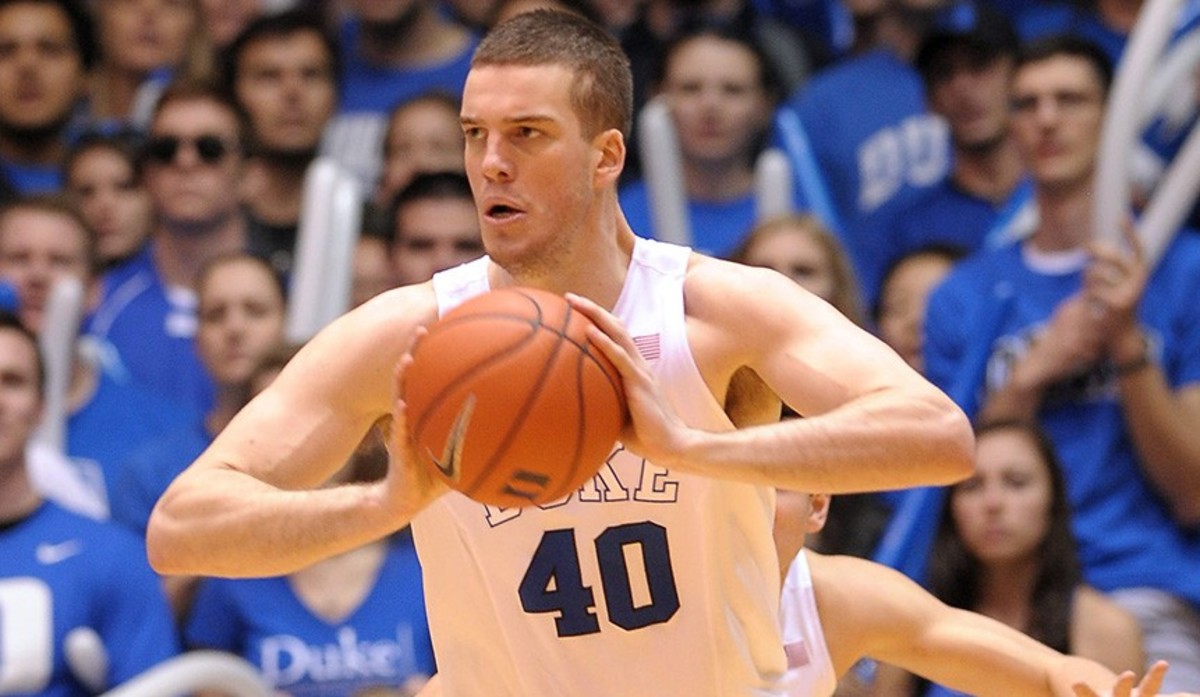
Getty Images
Marshall Plumlee, 7'1" senior, Duke
Plumlee and Duke coach Mike Krzyzewski literally have their own language. Krzyzewski is a graduate of West Point who served in the U.S. Army as a captain. Plumlee is a member of Duke's ROTC program who was sworn in during a contract ceremony at Duke in Jan. 2015, committing to become a second lieutenant in the U.S. Army reserves once he is finished pursuing a professional basketball career.
"I try to use with him, privately, military analogies," Krzyzewski said in February. "The one about being the platoon leader and I'm the company commander, the company commander has platoons. As the company commander, when I give an order, how does the platoon leader use that in his own language to affect the result that you desire? Putting it in that way made him understand even more. And he keeps getting better and better with it."
A native of Warsaw, Ind., Plumlee was a McDonald's All-American as a senior in high school. His two older brothers, Miles and Mason, also played for Duke. He was inclined to follow their path, but not until after he received assurances from the Duke coaches that they weren't just offering him a scholarship because they did the same for his brothers. Plumlee redshirted his freshman year so he could develop, but there was not much indication over the next three years that he was going to be an impact player. Last season, he averaged just 9.6 minutes while playing behind freshman Jahlil Okafor on Duke's NCAA championship team.
Things changed dramatically for Plumlee—and for Duke—in December, when senior forward Amile Jefferson broke his foot and was lost for the season. The injury left Plumlee as the lone interior player in the team's six-man rotation. His emergence as a leader and Glue Guy has enabled Duke to remain among the nation's best teams. Plumlee has nearly quadrupled his scoring average from last season (it is now 8.1 points per game) and more than tripled his rebound average (8.7). He has also become a stout defender, shutting down opposing centers and closing out on ball screens, even though he knows the team cannot afford for him to get into foul trouble.
The biggest challenge for Plumlee has been to fight through the physical and mental fatigue of playing a long season with a short bench. That is where the bond between the team's player captain and its Army captain-turned-coach was most critical. "I do get tired, but that can't mean that I stop talking. That can't mean that I stop working on defense. Doing those things is unacceptable, tired or not," Plumlee said. "When Coach K called this year's Duke team my platoon, that really stuck a chord with me. I know what's expected of a leader in that situation."
Past All-Glue Teams
2015: Rico Gathers, Baylor; Alex Barlow, Butler; Josh Gasser, Wisconsin; Dustin Hogue, Iowa State; Tekele Cotton, Wichita State; Raphael Davis, Purdue; Briante Weber, VCU (Honorary member)
2014: Patric Young, Florida (capt.); Tekele Cotton, Wichita State; Josh Gasser, Wisconsin; Justin Jackson, Cincinnati; T.J. McConnell, Arizona; Akil Mitchell, Virginia
2013: Mike Hart, Gonzaga (capt.); Kyle Anderson, UCLA; Melvin Ejim, Iowa State; Roosevelt Jones, Butler; Nate Lubick, Georgetown; Travis Releford, Kansas
2012: Darius Miller, Kentucky (capt.); Quincy Acy, Baylor; Travis Releford, Kansas; Toure' Murry, Wichita State; Anthony Marshall, UNLV; Jorge Gutierrez, Cal; Zack Novak, Michigan
2011: Tyrone Nash and Carleton Scott, Notre Dame (co-captains); Terrell Bell, Virginia Tech; Brady Morningstar, Kansas; Draymond Green, Michigan State; Zack Novak, Michigan
2010: David Lighty, Ohio State (captain); Chris Kramer, Purdue; Reggie Redding, Villanova; Willie Veasley, Butler; Rick Jackson, Syracuse.
2009: J.T. Tiller, Missouri (captain); Taylor Griffin, Oklahoma; Jermaine Dixon, Pitt; Garrett Temple, LSU; Travis Walton, Michigan State.
2008: Stanley Burrell, Xavier (captain); Tory Jackson, Notre Dame; Dave Pendergraft, Gonzaga; Derrick Jasper, Kentucky; Justin Mason, Texas; Wisconsin (glue team).
2007: Dane Bradshaw, Tennessee (captain); Kyle Shiloh, Nevada; Dominique Kirk, Texas A&M; Othello Hunter, Ohio State; Marcus Landry, Wisconsin.
2006: Sean Dockery, Duke (captain); Dane Bradshaw, Tennessee; Mike Hall, George Washington; Sean Marshall, Boston College; Luc Richard Mbah a Moute, UCLA; Kenton Paulino, Texas.
2005: Jamaal Levy, Wake Forest (captain); Louis Hinnant, Boston College; Erroll Knight, Gonzaga; Christian Moody, Kansas; Ellis Myles, Louisville; Roger Powell, Illinois.
2004: Jaron Brown, Pittsburgh (captain); Tyrone Barley, Saint Joseph's; Erroll Knight, Gonzaga; Roger Powell, Illinois; Nick Robinson, Stanford; Robert Tomaszek, Texas Tech.
2003: Rick Anderson, Arizona (captain); Jaron Brown, Pittsburgh; Justin Hamilton, Florida; Chuck Hayes, Kentucky; Robert Johnson, Oregon; Ellis Myles, Louisville; Tony Robertson, Connecticut.
2002: Gerald Fitch, Kentucky (captain); Dahntay Jones, Duke; Billy Knight, UCLA; Byron Mouton, Maryland; Jarrad Odle, Indiana; Antoine Pettway, Alabama.
2001: Sergio McClain, Illinois (captain); Nate James, Duke; Luke Walton, Arizona; Justin Hamilton, Florida; Marcus Toney-El, Seton Hall; Jason Capel, North Carolina.
2000: Lavor Postell, St. John's (captain); Alex Jensen, Utah; Nate James, Duke; Brian Beshara, LSU; Stevie Johnson, Iowa State.
